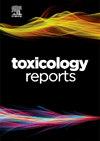石油工人接触超细颗粒物(PM0.1)与心血管疾病关系的临床研究
Q1 Environmental Science
引用次数: 0
摘要
这项研究调查了伊拉克南部巴士拉市石油工业员工的健康状况,重点关注他们接触有毒化学物质的情况,特别是氧化应激对心脏的影响。这项研究包括两组男性:第一组,90名员工接触到巴士拉的原油井场,90名个人作为对照组。本研究评估了参与者血液中的两种超细颗粒:多环芳烃代谢物[苯并芘二醇环氧化物(BPDE)]水平和有毒镉。该研究还旨在评估研究参与者血清中丙二醛(MDA)和超氧化物歧化酶(SOD)的水平,并监测血脂状况。结果显示,与对照组相比,接触组的BPDE水平高,血液中镉浓度高,脂质过氧化增加,SOD降低。结果还显示甘油三酯显著增加。活性氧产生的增加是动脉粥样硬化的主要危险因素,高甘油三酯表明动脉壁沉积,导致心血管疾病。本文章由计算机程序翻译,如有差异,请以英文原文为准。
Clinical study on the relationship between exposure to ultrafine particles (PM0.1) and cardiovascular diseases in petroleum workers
The study examines the health of petroleum industry employees in Basrah City, southern Iraq, with a focus on their exposure to toxic chemicals, specifically the impact of oxidative stress on their hearts. This study included two groups of men: in the first group, ninety employees were exposed to crude oil well sites in Basrah, and ninety individuals were in the control group. This study evaluated two ultra-fine particles in the participants' blood: the polycyclic aromatic hydrocarbon metabolite [Benzopyrene diol epoxide (BPDE)] level and the toxic cadmium. The study also aimed to evaluate the levels of malondialdehyde (MDA) and superoxide dismutase (SOD) in the serum of the study participants and monitor the lipid profile. The results showed high levels of BPDE, a high concentration of cadmium in the blood, increased lipid peroxidation, and decreased SOD in the exposed group compared to the control group. The results also showed a significant increase in triglycerides. The increase in reactive oxygen species production is a major risk factor for atherosclerosis, and high triglycerides indicate artery wall deposits, leading to cardiovascular disease.
求助全文
通过发布文献求助,成功后即可免费获取论文全文。
去求助
来源期刊

Toxicology Reports
Environmental Science-Health, Toxicology and Mutagenesis
CiteScore
7.60
自引率
0.00%
发文量
228
审稿时长
11 weeks
 求助内容:
求助内容: 应助结果提醒方式:
应助结果提醒方式:


